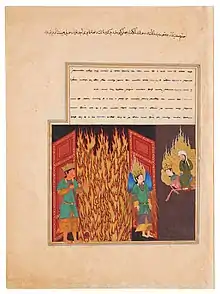Maalik
In Islamic belief, Maalik (Arabic: مالك / mālik) denotes an angel in Hell/Purgatory (Arabic: جهنم / jahannam) who administrates the Hellfire, assisted by 19 mysterious guards (Sura 74:30) known as Zabaniyya (az-zabānīya; Arabic: الزبانية). In the Qur'an, Maalik is mentioned in Sura 43:77 as the chief of angels of hell. However the Qur'an itself does neither explain nor specifically describe the origin, purpose or character of Maalik, but Islamic traditions expands the depictions with extra-quranic narratives. Actually the earliest codices offer various alternative spellings of this word including malak meaning "angel", instead of a proper name.[1]
| Part of a series on |
| Eschatology |
|---|

| Part of a series on |
| Islam |
|---|
 |
|
In Qur'an
In 43:77 and the following, the Qur'an describes Maalik telling the people in hell that they must remain there: "Surely, the disbelievers will be in the torment of hell to abide therein forever. [The torment] will not be lightened for them, and they will be plunged into destruction with deep regrets, sorrows and in despair therein. We wronged them not, but they were the wrongdoers. And they will cry: 'O Malik! Let your Lord make an end of us!' He will say: 'Surely, you shall abide forever.' Indeed we have brought the truth to you, but most of you have a hatred for the truth." 66:6 points out, that the punishments are carried out by God's command: "O you who believe! Save yourselves and your families from a fire [Jahannam] whose fuel is men and stones, over which are [appointed] angels stern and severe, who flinch not [from executing] the commands they receive from God, but do [precisely] what they are commanded".
In Muhammad's Night Journey
According to Islamic tradition, Muhammad met the angel Maalik during his heavenly journey. Therefore, Muhammad arrived in heaven and all the angels greeted him with a smile except Maalik. When Muhammad asked Jibra'il, why he remains taciturn therefore, he reveals Maalik as the guardian of Hell who never smiles. After that, Muhammed asked him to show Hell and Maalik opened its gates, showing him a glimpse of suffering for the inmates.[2][3]
References
- Christian Lange Paradise and Hell in Islamic Traditions Cambridge University Press 2015 ISBN 978-1-316-41205-3 page 53
- Alan E. Bernstein Hell and Its Rivals: Death and Retribution among Christians, Jews, and Muslims in the Early Middle Ages Cornell University Press 2017 ISBN 978-1-501-71248-7
- Brooke Olson Vuckovic Heavenly Journeys, Earthly Concerns: The Legacy of the Mi'raj in the Formation of Islam Routledge 2004 ISBN 978-1-135-88524-3 page 37